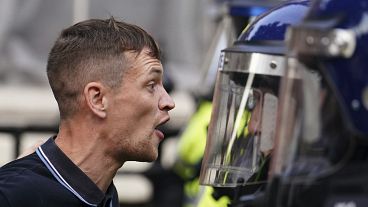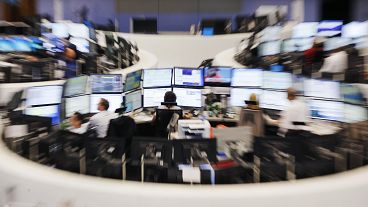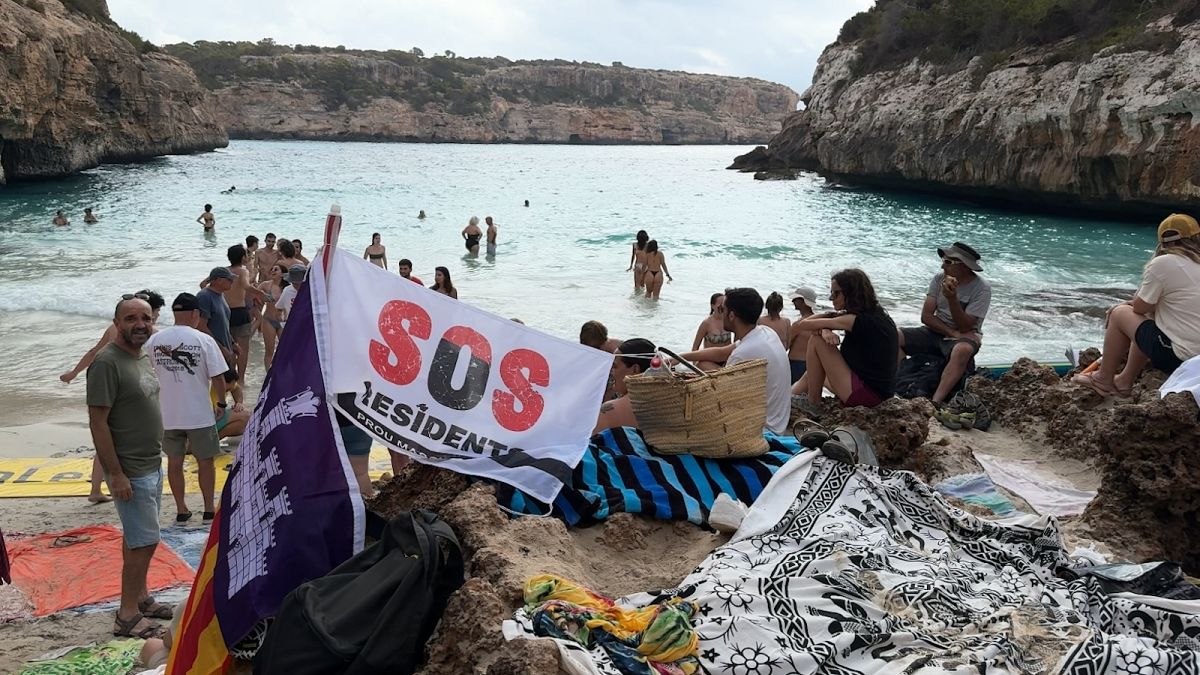A wave of protest against the negative impact of mass tourism is sweeping over Spain’s most popular holiday hotspots. Euronews reporter Valérie Gauriat travelled to Majorca, the biggest of the Balearic Islands, to hear from residents who feel their future is under threat.
"Go home!", cries out a man in swimming togs, frantically waving at a group of bewildered tourists trying to access the Caló des Moro, one of Majorca’s most famous and picturesque beaches. He is one of the dozens of residents who had come early that Sunday to occupy the site, in protest againsst the "massification" of tourism, which they say has "devastating effects" on their island, and their lives.
“We have cruises [cruise ships] every day with thousands of people. We have a flight every minute! It’s cars, it’s pollution. Beaches, restaurants are full of the streets are full of people! We’re fed up!” exclaims Joana Maria Estrany Vallespir, from “SOS Residents”, a protest collective.
“TOURISM IS KILLING US”
"In one day, up to one million people come here! It’s unbearable!” storms Sara, a young protester. “They’re erasing our identity, they’re pushing us out, because they bought everything! They say Majorca lives off tourism? No, tourism lives off us, and it’s killing us!”
Majorca, the largest of the archipelago, has a population of just under a million. It expects to host some 20 million visitors this year. An all-time record.
Tourism represents nearly half of the GDP of the Balearic Islands. An economic windfall which does not benefit everyone.
The all-inclusive packages from major hotel chains, or ferry companies whose giant ships dock every day in the port of Palma de Mallorca, the capital, even have the opposite effect, for part of the local commerce.
“There are lots of people, but their financial means are much lower, since the pandemic” says Kristina, who works in a bodega in the city centre. “There are more all-inclusive hotel offers, more holiday rentals. People prefer to stay in a flat and prepare their own food. At best they go to a bar for a drink or a sangria, they sometimes share.”
Across the road from where Kristina is standing, Cecilia Peña Rosselló runs Humus, a sustainable clothing shop. “There are almost only franchises left.”, she sighs. “They are the only ones who can survive on the main streets. The city is losing its identity because traditional commerce is leaving.”
Added to the deterioration in the quality of life, a shortage of housing is hitting residents hard.
The surge in real estate prices is notably causing public service employees to flee. In a tourism-driven economy, most jobs are seasonal in Majorca.
HOUSING PRICES ARE PROHIBITIVE FOR RESIDENTS
As a tourist bus drive, Diego Villa earns more than 2,000 euros a month. But he struggles to make end meets, and now lives in a camping-car. He can’t afford rent, or to buy property.
“The flats are built for foreigners and the prices are for foreigners, they are prohibitive. I thought several times of leaving Majorca because of this situation.”
Diego’s daughter Flore lives in another camping-car right next to hs. A lifestyle she prefers to sharing a flat, an option which is the only way to afford housing for more and more young workers in the island.
“I work as a waitress, and I earn very well compared to other places in Spain. But even so, renting a flat for one person is something you can't afford. And here, I have more independence than I would in a shared rental.”
Neus Truyol, a Sociologist, and left-wing former municipal councilor, blames much of the increasing precariousness on international speculation, and the island’s new right-wing majority.
“Rich people or companies with a lot of capital come here to invest, to buy houses; they know that the price of housing rises every year, and it’s a very profitable speculation business. The prices of housing or of the shopping basket, since 80% of fresh food is imported, are so high, that working families can’t make ends meet.”, she says. “Measures were taken in recent years, which prohibited tourist rental of single flats in Palma, or limited the number allowed in the city, but now such initiatives are being stopped.”
Faced with growing anger among the population, local authorities have however promised new measures to curb mass tourism.
ON A PATH TOWARDS COLLAPSE
It’s not enough, says Margalida Ramis, the head of Majorca’s main environmental defence organization, GOB, for whom climate change makes radical reform and diversification of the island's economic model urgent.
“More than half of the municipalities in Majorca don’t have drinking water. There are water restrictions in several municipalities, but this never applies to the hotel sector.”, she sighs.
“Protecting fertile soil and water resources should be strategic issues from the point of view of economic policies and it’s not the case.
The reality is that there are current plans to expand the operational capacity of Palma airport and to expand the port of Palma. There’s also a decree law that allows the increase of tourist places on rural land. Obviously, we are accelerating on our path to collapse.”
According to estimates, the number of tourists in Spain is expected to reach an all-time high in 2024.
CLICK IN THE PICTURE ABOVE TO SEE THE FULL REPORT












